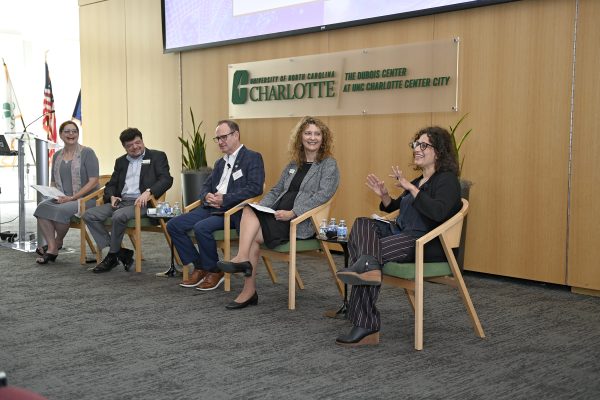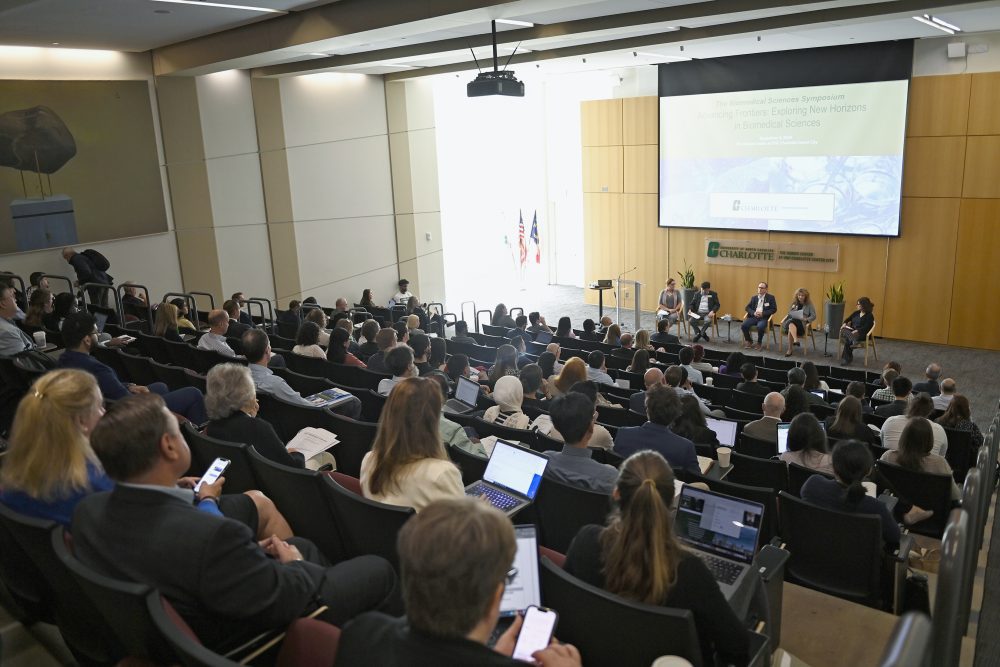Advancing Frontiers: Exploring New Horizons in Biomedical Sciences

The UNC Charlotte Division of Research and the North Carolina Biotechnology Center hosted the 2024 Biomedical Sciences Symposium on Sept. 9 at the Dubois Center at UNC Charlotte Center City. The symposium offered the opportunity for attendees to “seek catalytic partnerships that can lead to a big vision for building solutions in the biomedical sciences,” said Deb Thomas, associate vice chancellor for the Division of Research.
More than 350 attendees participated in the conference, a day-long event highlighting innovation and translational research featuring speakers, research presentations and poster sessions in topics such as cancer research, regenerative medicine, artificial intelligence in biomedical sciences, diagnostic imaging, infectious diseases and global health, medical devices, and nanomaterials and structure-based drug design.
Thomas cited the importance of hosting the conference on campus after a pandemic pause due to UNC Charlotte’s 272 percent increase in research expenditures in the past decade, the recent establishment of the College of Science and the university’s overall enrollment growth, with 40 percent of Charlotte students in STEM fields.
“We decided this was an inflection moment in the life sciences at UNC Charlotte and that reinvigorating this symposium on our campus is really important, tying us together with the region,” said Thomas.

NCBiotech President and CEO Doug Edgeton was a featured speaker and showcased North Carolina’s place as a national leader in the biomedical field, with more than 830 life sciences companies in the state for a workforce of 75,000+ people in manufacturing, contract research and testing, research and development, and agricultural technology. The NCBiotech Charlotte office, which opened in 2006, has supported the strengths of the Charlotte area, outlined by Edgeton as advanced manufacturing and metrology, biomanufacturing, computational life sciences and health informatics, medical devices, and human health and nutrition. “The Charlotte region is such a rich part of the tapestry of the state and we are so blessed to have an area of the state that is growing,” said Edgeton.
A panel of Charlotte college leadership discussed interdisciplinary biomedical research and centers across the university, highlighting the collaborations and innovations from faculty and students. The panelists were: College of Science Dean Bernadette Donovan-Merkert, College of Computing and Informatics Dean Bojan Cukic, William States Lee College of Engineering Dean Rob Keynton and College of Health and Human Services Associate Dean for Research & Graduate Studies Shanti Kulkarni.
The featured speakers continued with Jai Patel, vice president of research at Atrium Levine Cancer Center at Atrium Health, and Anthony Atala, director of Wake Forest Institute for Regenerative Medicine, who discussed genomics and cancer research and advancements in organ transplants. Steve Kearney, chief medical officer at SAS, presented on the applications of artificial intelligence and implications in the biomedical sciences.
The afternoon breakout sessions offered 29 different speakers highlighting their research from medical groups, UNC Charlotte and Wake Forest. A poster session and competition completed the day’s agenda.
The conference also showcased four different biomedical related research centers at Charlotte. Highlights included Daniel Janies, director of CIPHER: Computational Intelligence to Predict Health and Environmental Risks; Juan Vivero-Escoto, director of CITRANS: Center for Innovation, Translational Research and Applications of Nanostructured Systems; XiuXia Du, director of CEMIT: Center for Environmental Monitoring and Informatics Technologies for Public Health; and Pu Wang, co-director of AI Center for Human Digital Twin and Computational Health.
Additional sponsors of the event included Illumina, BioCytics, and the Carolina BioOncology Institute.